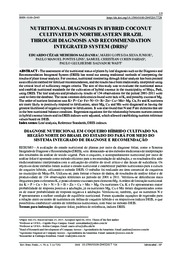Nutritional diagnosis in hybrid coconut cultivated in northeastern brazil through Diagnosis dnd Recommendation Integrated System (Dris).
Nutritional diagnosis in hybrid coconut cultivated in northeastern brazil through Diagnosis dnd Recommendation Integrated System (Dris).
Author(s): SALDANHA, E. C. M.; SILVA JÚNIOR, M. L. da; LINS, P. M. P.; FARIAS, S. C. C.; WADT, P. G. S.
Summary: The assessment of the nutritional status of plants by leaf diagnosis such as the Diagnosis and Recommendation Integrated System (DRIS) has stood out among traditional methods of interpreting the results of plant tissue analysis. For coconut, nutritional monitoring through foliar analysis has been pointed as an efficient method for fertilizer recommendation, and the results have been traditionally interpreted using the critical level of sufficiency ranges criteria. The aim of this study was to evaluate the nutritional status and establish nutritional standards for the cultivation of hybrid coconut in the municipality of Moju, Pará, using DRIS. The leaf analysis and productivity results of 134 observations for the period 2001-2011 were used to form the database. The most common deficiencies found were lack of K, and possibly excess of Mg. The order of nutrient limitation was K> P> Ca> Fe> N> O> B> Zn> Cu> Mn> Mg. Ca, Fe and K nutrients are more likely to positively respond to fertilization, since Mg, Cu and Mn were diagnosed as having the greatest likelihood of negative response to fertilization. It was also found that N and P are elements that are in the best nutritional balance condition. Regression equations for the relationship between nutrient content in hybrid coconut leaves and its DRIS indexes were adjusted, which allowed establishing nutrient reference values based on DRIS.
Publication year: 2017
Types of publication: Journal article
Unit: Embrapa Rondônia
Observation
Some of Embrapa's publications are published as ePub files. To read them, use or download one of the following free software options to your computer or mobile device. Android: Google Play Books; IOS: iBooks; Windows and Linux: Calibre.
Access other publications
Access the Agricultural Research Database (BDPA) to consult Embrapa's full library collection and records.
Visit Embrapa Bookstore to purchase books and other publications sold by Embrapa.

